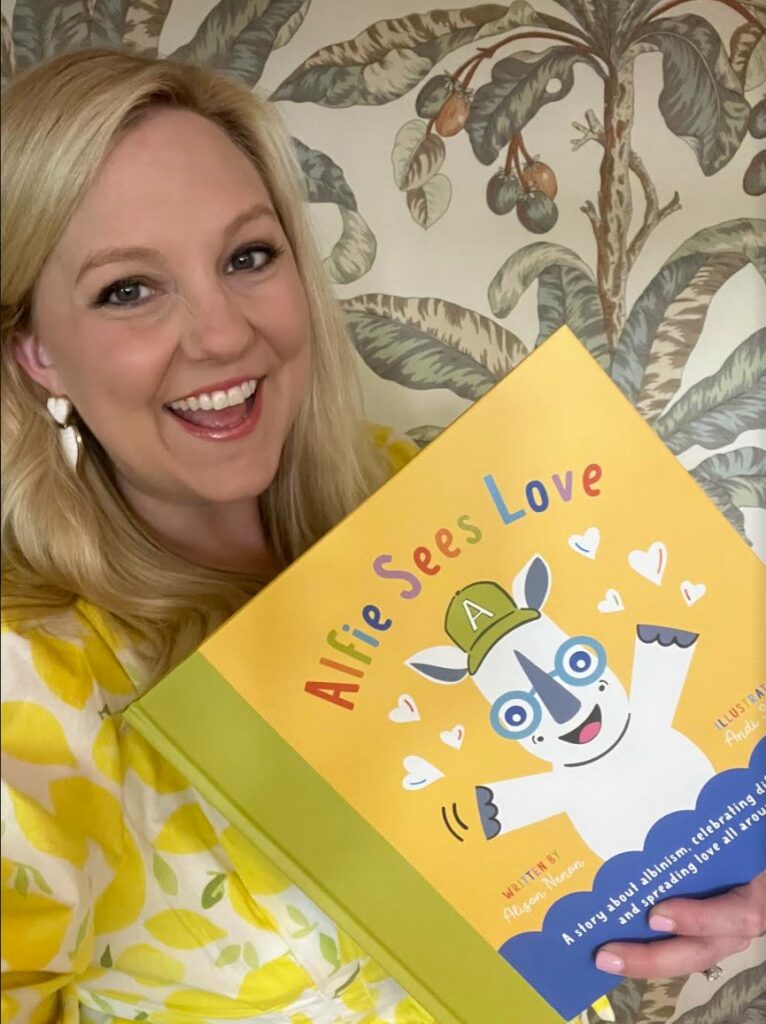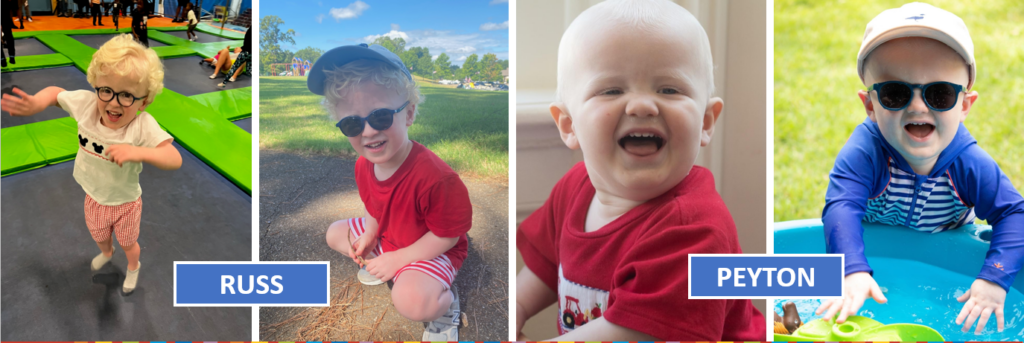On March 5, 2019, my son Russ shocked the delivery room with a full head of bright white hair. The nurses called it “rockstar” hair! He was the cutest little dude, with folks all over the hospital stopping by to see “the baby with the white hair” that all of us blonde ladies pay the big bucks for. We were absolutely in love.
It wasn’t until Russ was three months old that we noticed something was different about his eyes. They were darting back and forth. He also struggled to track and focus, and he didn’t make a lot of eye contact. My husband and I took him to a pediatric ophthalmologist, and with a simple eye exam, Russ received a diagnosis that changed our world forever – albinism.
Albinism
The full, technical name of the diagnosis is oculocutaneous albinism (OCA). OCA is a rare genetic condition that causes reduced pigment in hair, skin, and eyes. It’s associated with reduced visual acuity (blurred vision), sensitivity to light (Russ wears sunglasses and hats outside), and uncontrollable eye movements called nystagmus. Glasses help sharpen what Russ sees, but he has low vision that can’t be corrected to 20/20 (yet! I always hope correction will be possible in his lifetime…). And, of course, Russ wears buckets of sunscreen because the lack of pigment in his skin makes him more susceptible to sun damage.
When we first learned of Russ’ albinism, we were devastated. What kind of challenges were in store for our little rockstar? Would he struggle in school? Would he be treated kindly? What did this mean for any future children we might have? (We learned it meant a 25% chance of albinism every pregnancy.) We grieved the loss of what we expected parenting to look like and simultaneously sprang into action. This was our new reality, and we were determined to give Russ every opportunity to succeed.
Moving Forward
We quickly enrolled him in early intervention services to receive various therapies to support his development. We also joined the National Organization for Albinism and Hypopigmentation (NOAH) and got connected to an amazing community and wealth of resources.
As time passed, we started getting comfortable with albinism. So comfortable that in June 2021, we welcomed another boy we named Peyton! And guess what?! He was born with “rockstar” hair too. We were excited about the bond he and Russ would share.
At the same time all this excitement was happening, we noticed some developmental delays with Russ. He was late to walk, behind with language and fine motor skills, not responding to his name or simple commands, and showing a lot of repetitive behaviors with play. I spent countless hours in a dark Google hole researching how low vision impacts development because I didn’t know how to discern what was going on and why … Over time, it became clear there more was going on with my little rockstar than his albinism.
Autism
We chose to have Russ evaluated for autism spectrum disorder (ASD), and on August 6, 2021, he received a diagnosis of ASD. We once again found ourselves grieving the loss of our vision for parenthood. As we worked through these emotions, one of Russ’ amazing therapists shared the following poem with me. It brought me to tears as it so beautifully described how I was feeling and simultaneously gave me encouragement and hope for the future.
Poem
Welcome to Holland
I am often asked to describe the experience of raising a child with a disability – to try to help people who have not shared that unique experience to understand it, to imagine how it would feel. It’s like this……
When you’re going to have a baby, it’s like planning a fabulous vacation trip – to Italy. You buy a bunch of guide books and make your wonderful plans. The Coliseum. The Michelangelo David. The gondolas in Venice. You may learn some handy phrases in Italian. It’s all very exciting.
After months of eager anticipation, the day finally arrives. You pack your bags and off you go. Several hours later, the plane lands. The stewardess comes in and says, “Welcome to Holland.”
“Holland?!?” you say. “What do you mean Holland?? I signed up for Italy! I’m supposed to be in Italy. All my life I’ve dreamed of going to Italy.”
But there’s been a change in the flight plan. They’ve landed in Holland and there you must stay.
The important thing is that they haven’t taken you to a horrible, disgusting, filthy place, full of pestilence, famine and disease. It’s just a different place.
So you must go out and buy new guide books. And you must learn a whole new language. And you will meet a whole new group of people you would never have met.
It’s just a different place. It’s slower-paced than Italy, less flashy than Italy. But after you’ve been there for a while and you catch your breath, you look around…. and you begin to notice that Holland has windmills….and Holland has tulips. Holland even has Rembrandts.
But everyone you know is busy coming and going from Italy… and they’re all bragging about what a wonderful time they had there. And for the rest of your life, you will say, “Yes, that’s where I was supposed to go. That’s what I had planned.”
And the pain of that will never, ever, ever, ever go away… because the loss of that dream is a very very significant loss.
But… if you spend your life mourning the fact that you didn’t get to Italy, you may never be free to enjoy the very special, the very lovely things … about Holland.
by Emily Perl Kingsley
Advice

My advice to parents navigating a new diagnosis and working through all the emotions that accompany tough news? Embrace your Holland. And any other countries you might find yourself in that weren’t on your original itinerary. It’s okay to feel ALL the feels and sometimes wish you were in Italy. When I find myself longing for Italy, Russ does something amazing, like say a word (he’s currently non-verbal) or give me a random hug. In these moments, I’m so thankful for my silly, smiley, jumping, flapping, spinning rockstar and his sweet brother who will help the world “see” beauty in differences. Beauty in Holland.
One of the ways I embrace my Holland is by writing children’s books that help normalize differences, teach empathy, and promote inclusion. The first book in the series is called Alfie Sees Love, and it’s about a rhinoceros with albinism who likes to go on adventures, celebrate differences, and spread love all around. You can learn more and grab a copy at www.alfieseeslove.com.
Stay tuned for more Alfie adventures (Spoiler alert! The next book is about Alfie on a treasure hunt with a seal friend with autism.), embrace your Holland, and spread love all around.
www.alfieseeslove.com
Follow us on Instagram
